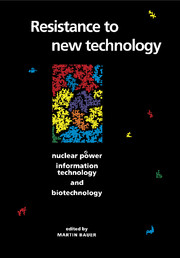Book contents
- Frontmatter
- Contents
- Contributors
- Preface
- 1 Resistance to new technology and its effects on nuclear power, information technology and biotechnology
- PART I Conceptual issues
- PART II Case studies
- PART III International comparisons
- PART IV Comparisons of different technologies
- PART V Afterword
- 19 Towards a functional analysis of resistance
- Index
19 - Towards a functional analysis of resistance
Published online by Cambridge University Press: 06 July 2010
- Frontmatter
- Contents
- Contributors
- Preface
- 1 Resistance to new technology and its effects on nuclear power, information technology and biotechnology
- PART I Conceptual issues
- PART II Case studies
- PART III International comparisons
- PART IV Comparisons of different technologies
- PART V Afterword
- 19 Towards a functional analysis of resistance
- Index
Summary
In this chapter I develop two ideas about resistance in social processes in a speculative manner, with the help of a functional analogy: (a) resistance is primarily a functional event in social processes – dysfunctionality is possible but secondary; and (b) resistance is a contribution that urges consideration of whether to sustain a process, in analogy to ‘acute pain’, and if so, how.
In whatever context, political, technological or economic, resistance is an action attribution, and as such the achievement of a communication system (Heidenscheder 1992). This analysis of resistance is mainly concerned with resistance in areas of present day technology, but makes use of ideas from other historical and political contexts. I explore a discursive schema with two main actors: an innovator and a resistant. Further differentiation is conceivable according to the various roles of the change agency (Ottaway 1983) and resistance (see Bauer, Chapter 1). The innovator proposes a project that is not acceptable and rejected tel-quel by the resistant part; in that mismatch mutually unexpected expectations meet. Concrete actors may change their roles in two ways. First, the innovator resists changes to the project; and resistance may become an initiator. Second, these parts of innovator and resistant are not scripted: they change as they are enacted.
Being interested in the function of resistance in a process, I focus on effects: how does resistance affect the process that is its target.
- Type
- Chapter
- Information
- Resistance to New TechnologyNuclear Power, Information Technology and Biotechnology, pp. 393 - 418Publisher: Cambridge University PressPrint publication year: 1995
- 9
- Cited by



